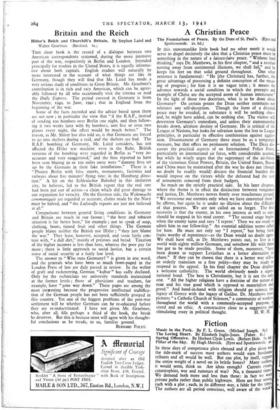Britain and the Reich
Hitler's Reich and Churchill's Britain. By Stephen Laird and Walter Graebner. (Batsford. 6s.)
Tins short book is the record of a dialogue between two American correspondents stationed, during the more intensive part of the war, respectively in Berlin and London. Intended principally for readers in the United 2tates, it is equally informa- tive about both capitals. English readers will naturally be more interested in the account of what things are like in Germany, though they will find that Mr. Laird has made a very serious study of conditions in Great Britain. Mr. Graebner's contribution is in rich and racy American, which can be agree- ably followed by all who occasionally visit the cinema or read the Daily Express. The period covered in Germany is from November, 1940, to June, 5941 ; that in England from the beginning of the war. Some of the facts recorded and the advice based upon them are not new ; in particular the view that " if the R.A.F., instead of sending too bombers over Berlin one night, and then follow- ing it two weeks later with 85 bombers, sent five or even two planes every night, the effect would be much better." The reason, as Mr. Shirer has also told us, is that Germans are forced to go into shelters during a raid, and the shelters are bad. The R.A.F. bombing of Germany, Mr. Laird considers, has not affected the Hitler war machine, even in the Ruhr. British versions of the bombing were regarded in Berlin as " very in- accurate and very exaggerated," and the fires reported to have been seen blazing 5o or too miles away were " dummy fires set up by the Germans in their fake installations." There is a " Phoney Berlin with false streets, monuments, factories and railways about five minutes' flying time in the Hamburg direc- tion." A hit on the Schlesischer Bahnhof in this imitation city, he believes, led to the British report that the real one had been put out of action—a claim which did great damage to our reputation for veracity. On the German side, the Wehrmacht communiqués are regarded as accurate, claims made by the Navy must be halved, and "the Luftwaffe reports are just not believed at all."
Comparisons between general living conditions in Germany and Britain are much in our favour ; " the beer and tobacco situation is far better here," for example ; not to speak of soap, clothing, boots, tinned fruit and other things. The German people blame neither the British nor Hitler ; " they just blame the war." They have, however, accepted, and seem fairly con- tent with, " a dull diet," mainly of potatoes and bread. Taxation of the higher incomes is less than here, whereas the poor pay far more ; there is little approach to social justice, but a certain sense of social security at a fairly low level.
The answer to " Who runs Germany? " is given in one word, and the generals who have been so much front-paged in the London Press of late are duly passed in review. In the welter of graft and racketeering, German " kultur " has sadly declined. Only for the technicians are university standards maintained at the former levels ; those of physicians and teachers, for example, have " gone way down." These pages are among the most interesting because the progressive intellectual stultifica- tion of the German people has not been sufficiently grasped in this country. Yet one of the biggest problems of the post-war settlement will be whether Germans can be re-educated before they are re-indoctrinated. I have not given Mr. Graebner, who, after all, fills perhaps a third of the book, the break he deserves. But this is because most will agree with his thought- ful conclusions as he treads, to us, familiar ground.
BERNARD FOLEY.


























 Previous page
Previous page